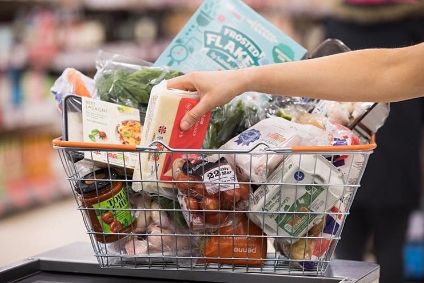
Consumers in the UK increased their grocery shop over a four-week period as the coronavirus crisis caused more people to eat at home as restaurants and entertainment outlets closed to contain its spread.
Data from Kantar for the fours weeks to 22 March, the day before Prime Minister Boris Johnson announced a nationwide lockdown, showed the average UK household spent an extra GBP62.92 (US$77.73) on food shopping during the period. The rise in spending was more pronounced in London, where it climbed 26%.

Discover B2B Marketing That Performs
Combine business intelligence and editorial excellence to reach engaged professionals across 36 leading media platforms.
The London-based data provider said the overall rise was due to people making additional shopping trips and buying “slightly more” than they would normally rather than an “increase in very large trolleys”. However, the extra spending led to “record” March sales at major UK retailers.
“Purchasing of food and drink items for store cupboards rose by 28% during the past four weeks and by the same again for frozen goods,” Kantar said.
Meanwhile, families with children over the age of 16 spent an average GBP508 during the period, GBP88.13 more than in March last year, an aspect Kanta said was most likely linked to students returning home from college and university.
Fraser McKevitt, Kantar’s head of retail and consumer insights, said: “It’s inevitable that shoppers will add extra items to their baskets when faced with restrictions on their movement and possible isolation if one of them becomes unwell, but many families are also adjusting to having more mouths to feed.

US Tariffs are shifting - will you react or anticipate?
Don’t let policy changes catch you off guard. Stay proactive with real-time data and expert analysis.
By GlobalData“With restaurants and cafés now closed, none of us can eat meals on-the-go any longer and an extra 503 million meals, mainly lunches and snacks, will be prepared and eaten at home every week for the foreseeable future.”
Kantar said grocery shopping trips started to increase on 16 March, the day Johnson advised the public to avoid going to pubs, restaurants and entertainment venues. A few days later he restricted visits to those establishments completely as the number of Covid-19 cases grew.
“While week-on-week sales were growing strongly at the beginning of the month, it was on Monday 16 March that the public headed to the shops in unusually high numbers,” Kantar said. “Between Monday 16 and Thursday 19 March, 88% of households visited a grocer, making five trips on average – adding up to 42 million extra shopping trips across four days.”
Online shopping also rose, although the limited number of delivery slots available capped the increase at 13% compared to the same period a year ago.
The average online basket size was GBP81.88, up GBP6 from a year earlier.
Kantar added that only 14.6% of households received an online delivery in the past four weeks, up from 13.8% in March last year, “but probably well below actual demand”.
“Most of us still relied on the full-size, bricks-and-mortar stores operated by Tesco, Sainsbury’s, Asda, Morrisons, Waitrose, Aldi and Lidl,” McKevitt said. “They took 76% of spend through their tills in the past four weeks, with sales 19% higher than March 2019.”
McKevitt added: “It has been an extraordinary month and social distancing measures have had a profound impact on all our daily lives – from the way we work and socialise, to how we shop and care for our loved ones. Retailers and their staff have been on the frontline as households prepare for an extended stay at home, with grocery sales amounting to GBP10.8bn during the past four weeks alone – that’s even higher than levels seen at Christmas, the busiest time of year under normal circumstances.”
Going forward, McKevitt expects the panic buying seen in recent weeks to start to subside and also does not envisage a repeat of shoppers’ purchasing patterns seen during most of March.
“While much-reported panic buying has been concentrated to a relatively low number of individuals so far, we anticipate that this too will subside as consumers gain confidence in the retailers’ abilities to maintain grocery supplies and keep stock on the shelves,” he said.





